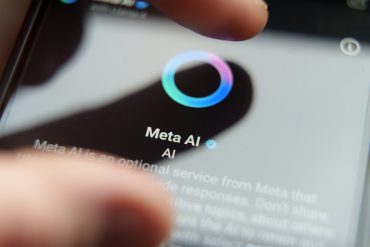

Meta’s AI chatbots actively initiate conversations across social platforms to boost user engagement and combat digital isolation
Key Takeaways
- Meta launches proactive AI chatbots that initiate conversations without user prompts through “Project Omni,” marking a strategic shift from passive to engagement-driven AI interactions across Facebook, Instagram, and WhatsApp.
- $1.4 trillion revenue projection by 2035 from generative AI products, with Meta forecasting $2-3 billion in 2025 as the company positions itself to capture market share in the rapidly expanding chatbot sector valued at $15.57 billion.
- Safety concerns emerge following Character.AI’s recent lawsuit involving a 14-year-old user, raising questions about Meta’s age restrictions and content moderation for unsolicited AI interactions.
Introduction
Meta transforms its AI strategy by developing chatbots that start conversations without waiting for user prompts, representing the company’s most aggressive push into engagement-driven artificial intelligence. The social media giant internally calls this initiative “Project Omni,” designed to boost user retention and interaction across its family of apps.
Leaked documents reveal Meta trains these AI companions to reference previous conversations and maintain distinct personalities, from film enthusiasts to business consultants. The proactive messaging feature launches through Meta’s AI Studio platform, allowing users to create custom chatbots that can independently reach out to continue past discussions.
Key Developments
Meta partners with data labeling firm Alignerr to train chatbots in proactive engagement techniques. The AI companions follow strict guidelines, only messaging users with existing conversation histories and stopping outreach if users don’t respond within specific timeframes.
The company establishes clear engagement boundaries through its messaging protocols. Chatbots refrain from sending additional messages unless users have exchanged more than five messages within 14 days, according to Business Insider’s report on the internal documents.
Project Omni extends beyond personal interactions into business applications. Meta develops specialized chatbots for brands to automate customer service, provide product recommendations, and facilitate direct sales through WhatsApp and Messenger platforms.
Market Impact
The global chatbot market shows robust growth momentum, expanding from $15.57 billion in 2025 to an projected $46.64 billion by 2029. Meta’s proactive approach positions the company to capture significant market share as businesses seek automated engagement solutions.
ChatGPT currently dominates with 60.5% market share, but competitors including Claude AI, Perplexity, and Google Gemini demonstrate rapid growth. Meta’s differentiation through unsolicited messaging creates a new competitive dynamic in the AI assistant landscape.
Businesses adopting chatbot technology expect substantial cost savings, with projections indicating up to $11 billion in savings and 2.5 billion hours of operational efficiency gains in 2025. These economics drive enterprise adoption of Meta’s business-focused AI solutions.
Strategic Insights
Meta’s proactive chatbot strategy aligns with CEO Mark Zuckerberg’s stated mission to combat social isolation through technology. The company frames unsolicited AI interactions as addressing the “loneliness epidemic,” though critics note the correlation between increased engagement and advertising revenue.
The initiative reflects Meta’s core business model of maximizing user time on platforms to drive ad revenue. Proactive chatbots extend this strategy into AI, creating new touchpoints for user interaction beyond traditional social media browsing.
Meta’s approach contrasts with passive AI assistants by creating persistent, personality-driven relationships. This strategy potentially transforms how users perceive AI from tools to companions, fundamentally altering the human-AI interaction paradigm.
Expert Opinions and Data
Holger Mueller of Constellation Research Inc. describes Meta’s initiative as walking “a very fine line” between boosting engagement and appearing intrusive. “The success of these interactions will be determined by their quality, frequency and relevancy,” Mueller explains, noting Meta’s expertise and scale advantage in executing this strategy.
A Meta spokesperson confirms the company tests follow-up messaging features while emphasizing user control mechanisms. “This allows you to continue exploring topics of interest and engage in more meaningful conversations with the AIs across our apps,” the spokesperson states.
Industry analysts view Meta’s $1.4 trillion revenue projection with measured optimism, recognizing the ambitious nature of achieving such scale. The projection depends on successful monetization across multiple industries and widespread adoption of AI companion technology.
Conclusion
Meta’s proactive AI chatbot initiative represents a fundamental shift in how social media companies approach user engagement through artificial intelligence. The strategy positions Meta to capture substantial market share in the expanding chatbot sector while extending its advertising-driven business model into new AI territories.
The success of Project Omni depends on user acceptance of unsolicited AI interactions and Meta’s ability to balance engagement optimization with responsible AI practices. The company’s vast user base and technical resources provide significant advantages in scaling this approach across its platform ecosystem.





